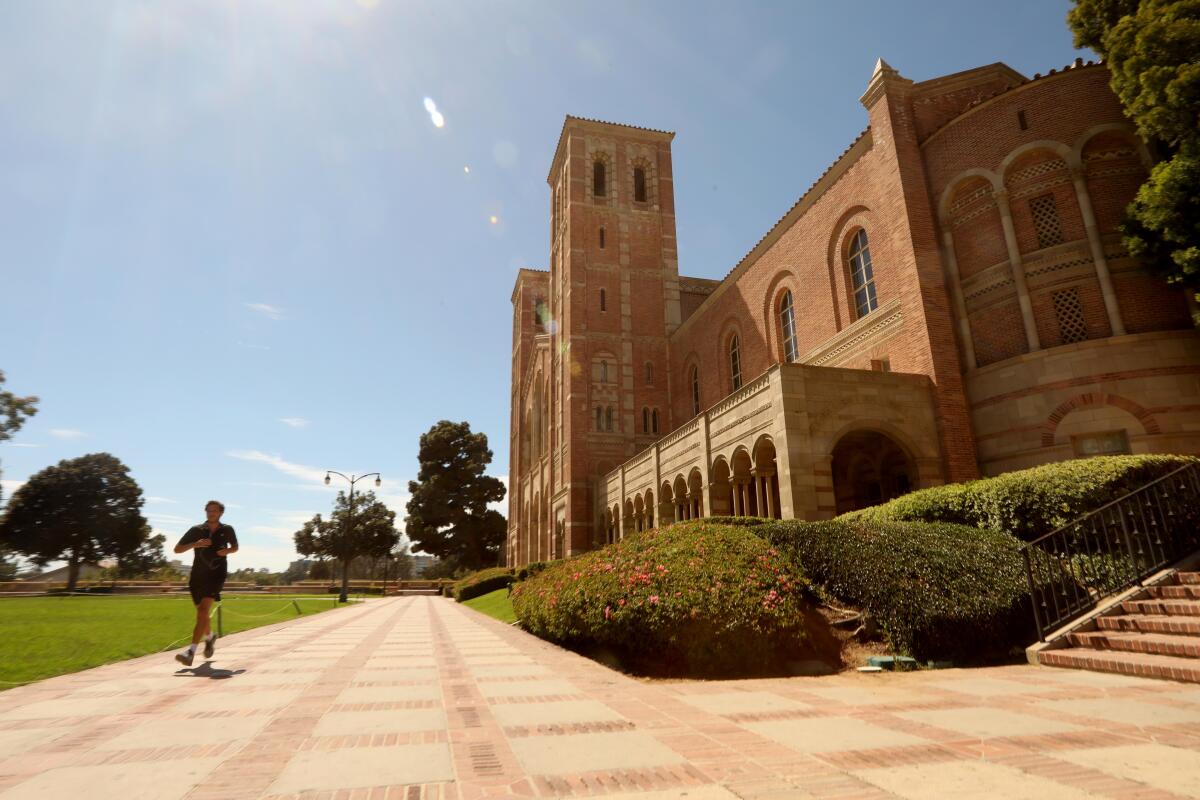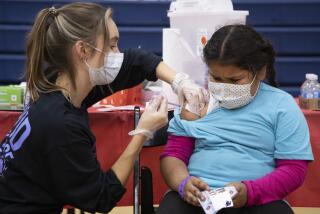UC mandates COVID-19 vaccinations and will bar most students without them from campus

- Share via
The University of California announced Thursday that COVID-19 vaccinations will be required before the fall term begins for all students, faculty and others, becoming the nation’s largest public university system to mandate the vaccines even though they don’t have full federal approval.
As the highly contagious Delta variant spreads amid lower vaccination rates among younger people, unvaccinated students without approved exemptions will be barred from in-person classes, events and campus facilities, including housing — and not all classes will be offered online, a UC memo outlining the mandate said. Physical distancing and mask wearing are expected to continue.
“Vaccination is by far the most effective way to prevent severe disease and death after exposure to the virus and to reduce spread of the disease to those who are not able, or not yet eligible, to receive the vaccine,” UC President Michael V. Drake said in a letter to the system’s 10 chancellors.
He said the final policy was the product of consultation with UC infectious disease experts and ongoing review of evidence from medical studies on the dangers of COVID-19 and emerging variants. UC officials also assessed the safety and effectiveness of the vaccines for preventing infection, hospitalizations and deaths from COVID-19, and for reducing its spread.
California State University is still hashing out its requirements and currently plans to mandate vaccinations only after the U.S. Food and Drug Administration gives full approval to at least one of the vaccines. The Los Angeles Community College District also is encouraging, but not requiring vaccinations for students, faculty and staff.
The differing policies among three California public higher education systems, which collectively educate more than 1 million students, underscore the continued uncertainty around campus health and safety protocols at colleges across the nation. In addition, questions remain over whether public educational institutions have the legal right to require inoculations of vaccines that have not received full federal approval.
The debate has raged across higher education nationwide, as campuses take different stands on those legal issues and some students have filed lawsuits over them. More than 580 institutions have announced mandates, according to a Chronicle of Higher Education tracker, including more than 60 in California, such as USC, Caltech, Stanford, Occidental, Chapman, Pepperdine and the Claremont Colleges.
But UC is one of the few public university systems to announce it will impose the mandate even if the vaccines remain under emergency use authorization. UC had earlier announced it would require vaccinations only after vaccines received full FDA approval. But after additional medical studies further documented the vaccines’ safety and efficacy and UC faculty, staff and students expressed strong support, UC moved forward with the requirement.
Narrow exemptions and exceptions will be allowed based on medical, religious and disability grounds, along with deferrals due to pregnancy. Proof of vaccination or requests for exemptions must be submitted no later than two weeks before the first day of fall instruction. UC Berkeley and UC Merced begin fall semester in August while the other campuses are on quarter systems and start in September.
But legal questions remain. In New York, for instance, Gov. Andrew Cuomo has said mandates must wait for full FDA approval, a position adopted by both the state and city university systems. The Los Angeles Community College District has reached a similar conclusion.
“You cannot legally make people take an ‘emergency vaccine,’ which is why there are no laws passed at the federal or state levels to mandate COVID-19 vaccines,” said William Boyer, the district spokesman.
UC officials say they believe they have the right to impose a mandate.
“The University has always believed and still believes that it is legally permissible to impose a mandate during Emergency Use Authorization, and the Equal Employment Opportunity Commission has also issued guidance that employers may require their employees to be vaccinated against COVID-19 (subject to certain exceptions) as a condition of physical access,” a UC statement said. “The most important consideration is for people to be vaccinated to support the public health and safety of our communities.”
Some argue that students are free to refuse vaccinations — although, under the UC policy, they would then be barred from entering any campus facility, including housing and classrooms, unless they have approved exemptions.
A vaccine mandate under emergency use authorization could also be viewed as undermining an individual’s federal right of refusal, if educational benefits or employment rights would be adversely affected, and could invite litigation alleging that the institutions are facilitating unlawful human experimentation, according to a May legal advisory by Mark LeForestier, California Community Colleges general counsel.
The California College Republicans, for instance, are “actively exploring legal options,” a spokesman said. Both the group’s executive committee and the California Federation of College Republicans have condemned mandatory vaccinations without full FDA approval. “We are committed to ensuring that students are not forced to take experimental vaccines in order to continue pursuing an education,” said Dylan Martin, the group’s spokesman and UC San Diego graduate.
Three Chico State students have sued the CSU system, arguing that a potential vaccine mandate will violate their constitutional rights to liberty by depriving them of “bodily autonomy” to refuse a vaccine they consider dangerous.
In a statement, CSU said any future decision over mandates would be made “in the best interest of our campus communities and will help protect students, faculty, staff and their families.”
At least two UC employee unions argue that UC does not have the right to impose the mandate without a negotiated agreement on vaccination policy.
The American Council on Education, which represents more than 1,700 colleges and universities, issued a brief in March saying that courts would likely uphold the right of institutions to mandate COVID-19 vaccinations in line with existing flu vaccination requirements. A California court last year declined to halt UC’s flu vaccination mandate, saying a long list of previous cases had upheld such requirements.
Dorit Rubinstein Reiss, a professor at UC Hastings College of the Law, noted that students can refuse the vaccination and universities are not obligated to accommodate them because higher education is not a right, unlike K-12 education.
“It’s the university’s job to provide a safe campus and a vaccine mandate will increase campus safety,” she said. “It’s the right thing to do.”
Both the UC Student Assn. and the UC Academic Senate strongly support a vaccine requirement. Academic Senate members want a strong policy that clearly bars campus access to unvaccinated people and states that UC faculty will not be obligated to accommodate them with special remote instruction, whether they have an exemption or not, Senate Chair Mary Gauvain wrote in a May 28 letter to UC Vice Provost Susan Carlson.
Students will be required to enter dates of vaccination and upload an image of their COVID-19 vaccination card through their Student Health Services portals. UC staff will review and verify the information, the memo says.
At Cal State, students, faculty and staff may be able to self-attest that they’re vaccinated before the fall semester but the university is still finalizing a policy, which will also include medical and religious exemptions and be negotiated with various labor unions.
“Talking to union and student leaders, I think we’re in full agreement to work together to make sure everybody that comes to campus is safe,” CSU Chancellor Joseph I. Castro told The Times.
Chancellor Francisco Rodriguez of the Los Angeles Community College District recently reiterated to trustees that staff reviewed the vaccination issue and recommended “to not mandate but indeed to encourage, facilitate and incentivize — and we are indeed doing that.”
Last fall, California’s colleges and universities scrambled to prevent potential outbreaks as campuses reopened while COVID-19 cases surged throughout the state. Cases are rising again as campuses prepare to open for the fall term with in-person classes, full dormitories and a return to normal college life.
The number of younger people who have remained unvaccinated has been a cause for concern in California and across the country. In Los Angeles County, health officials said Saturday that 83% of 1,094 newly reported cases were among people under the age of 50. Residents ages 18 to 49 account for 70% of those cases.
State health officials could not immediately say how many people ages 18 to 22 have been vaccinated. But campus incentive programs targeting students to get the vaccine have been launched throughout the state. The growing need even prompted the Biden administration to turn to 18-year-old singer and actor Olivia Rodrigo to assist in urging younger people to get vaccinated through her social media platforms.
Students are also at risk from community spread around their campuses, UC San Francisco epidemiologist Dr. George Rutherford said. Commuter schools, where students come and go, may be at greater risk of spread than residential campuses where the community is more planted.
“If a significant number are unvaccinated or non- immune, like 15%, then we’re going to be in for trouble. If the vaccination rates are higher than that, then I think we’ll be OK,” Rutherford said.
More to Read
Sign up for Essential California
The most important California stories and recommendations in your inbox every morning.
You may occasionally receive promotional content from the Los Angeles Times.











